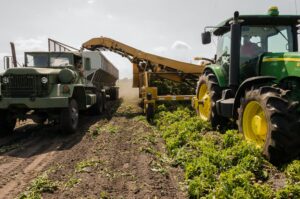The agriculture sector is facing a transformational skills and labour crisis, says a new report by RBC Economics.

Mark Stebnicki
It said that by 2033, 40 per cent of Canadian farm operators will retire, placing agriculture on the cusp of one of the biggest labour and leadership transitions in the country’s history. Over the same period, a shortfall of 24,000 general farm, nursery and greenhouse workers is expected to emerge.
And 66 per cent of producers do not have a succession plan in place, leaving the future of farmland in doubt.
“A rapidly approaching demographics crisis is set to make the problem worse. In 10 years, 60 per cent of today’s farm operators will be over the age of 65. Never have so many Canadian farmers been so close to retirement. In addition, the number of operators below the age of 55 has declined by 54 per cent since 2001.v The most immediate solution to this challenge rests at our borders. Providing permanent immigration status to over 24,000 general farm workers and 30,000 operators can assist in bridging retirement and staffing gaps, help the sector fulfill its productivity potential and meet domestic and foreign food demands,” said RBC.
“Many farms and greenhouses are already looking to other countries to address the need for low-skilled labour. Indeed, Canada’s agricultural sector is among the most diverse in the world though the degree of demand for foreign workers differs significantly by province and operation.
“The Temporary Foreign Workers program remains a critical source of low-skilled labour. But it has its disadvantages. First, it’s a provisional solution to a chronic issue. Second, many of these temporary foreign workers (TFWs) who develop skills essential to Canadian seeding and harvests, must return to their home countries for short periods. If they are unable to return to Canada (for reasons that can include their government barring the shift due to its own food security fears) then Canada’s on-farm workforce is dramatically reduced. Better policies are needed to enable the immigration of low-skilled labourers. For instance, a pathway to permanent residency for experienced TFWs will immediately address this type of shortage.”
 (Mario Toneguzzi is Managing Editor of Canada’s Podcast. He has more than 40 years of experience as a daily newspaper writer, columnist, and editor. He worked for 35 years at the Calgary Herald, covering sports, crime, politics, health, faith, city and breaking news, and business. He works as well as a freelance writer for several national publications and as a consultant in communications and media relations/training. Mario was named in 2021 as one of the Top 10 Business Journalists in the World by PR News – the only Canadian to make the list)
(Mario Toneguzzi is Managing Editor of Canada’s Podcast. He has more than 40 years of experience as a daily newspaper writer, columnist, and editor. He worked for 35 years at the Calgary Herald, covering sports, crime, politics, health, faith, city and breaking news, and business. He works as well as a freelance writer for several national publications and as a consultant in communications and media relations/training. Mario was named in 2021 as one of the Top 10 Business Journalists in the World by PR News – the only Canadian to make the list)
About Us
Canada’s Podcast is the number one podcast in Canada for entrepreneurs and business owners. Established in 2016, the podcast network has interviewed over 600 Canadian entrepreneurs from coast-to-coast.
With hosts in each province, entrepreneurs have a local and national format to tell their stories, talk about their journey and provide inspiration for anyone starting their entrepreneurial journey and well- established founders.
The commitment to a grass roots approach has built a loyal audience with over 120,000 downloads and thousands of subscribers on all our social channels and YouTube. Canada’s Podcast is proud to provide a local, national and international presence for Canadian entrepreneurs to build their brand and tell their story.





